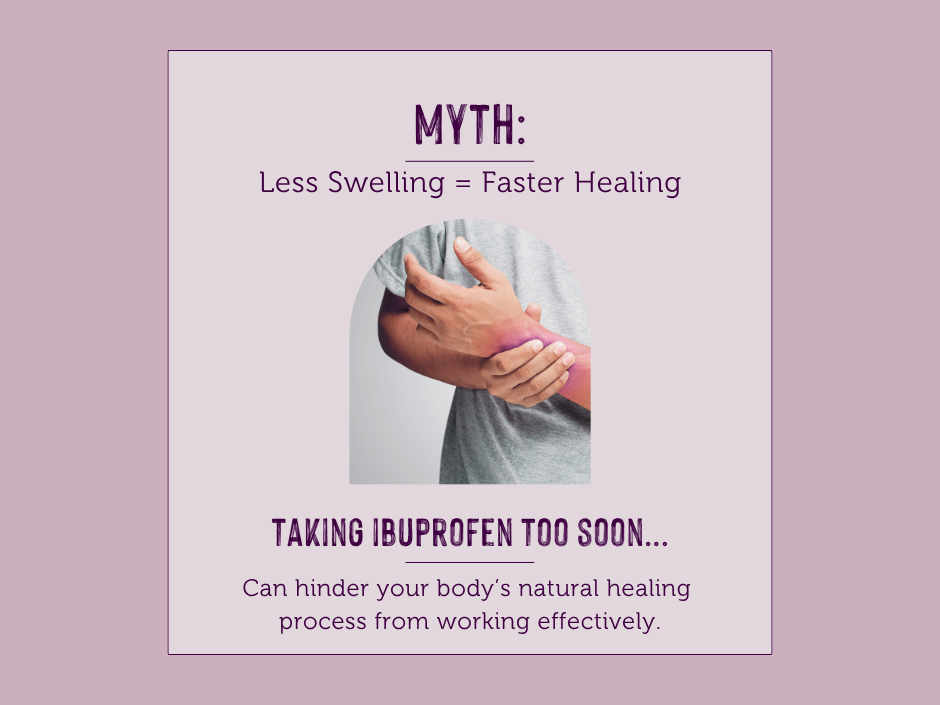Should You Really Be Taking Anti-Inflammatories After a minor Injury?
- carmenmakepeace

- Jul 11, 2025
- 4 min read

Here is What You Might Not Know
If you have ever had a sprain, a strain or even a nasty bump, than you have probably been told the same thing:
Take ibuprofen. Reduce the swelling. Get better quicker.

But what if that advice is not as helpful as we have been led to believe?
In fact, what if taking anti-inflammatories too soon after an injury might actually slow your recovery?
I am here to bust some myths and give you the knowledge you need to make informed choices about your healing.
Myth 1: Inflammation Is Bad
When something swells up, turns red or gets sore, we often assume that is a sign of something going wrong in the body.
In the early stages after an injury, those responses, like inflammation, is actually your immune system doing exactly what it is supposed to do.
Inflammation is your body’s way of protecting and repairing itself. It clears out damaged cells. It brings in nutrients. It sets the stage for new tissue to grow. Without the inflammation, healing would not happen.
Swelling is not the enemy. It is part of the process.

When we rush to calm it down with anti-inflammatories, we are getting short-term relief. What is more, we are potentially interfering with a very natural and necessary repair system.
Myth 2: Less Swelling = Faster Healing
This one feels intuitive, right? If it is less swollen, it must be healing.
However, that is not how the body works.
Think of swelling being like a crowd in a tiny nightclub.
The immune cells, fluids and nutrients are all trying to get into the same small space to do their job.
Is it a little chaotic, yes. It can also be quite uncomfortable.
What it is also being is productive.

If you take an inflammatory, like ibuprofen, too early, you quiet that crowd. You also send all the cleaners, repair crews and scaffolders home before they have even begun to do the real work.
In the short term, you might feel better. In the long term, you could be adding days or weeks to your recovery. If you want to work smarter not harder, keep reading.
Instead of taking anti-inflammatories you might want to apply ice instead.
Ice can reduce the swelling severity slightly. This will ease the pressure on those nerves that are reacting to that pressure and ease the pain.
Instead of totally diminishing the swelling, it allows your immune system to gently get in there and do its work. Think of it as a compromise, if you will.
TIPS ON APPLYING ICE:
Have the ice or ice pack wrapped in a piece of fabric.
Apply for 10 minutes at a time over the area.
Keep the ice moving.
After ten minutes, pop the ice back in the freezer.
Every two to three hours, take it back out and ice again.
Repeat this process several times in the first few days.

Remember swelling is not bad.
We are using ice to manage the pain that swelling causes and reduce it fractionally.
Pain management is one of the keys to managing an injury, alongside movement and mindfulness and to prevent chronic pain in the future.
So When Should You Take inflammatories?
There is no one-size-fits-all answer.
Anti-inflammatories absolutely have their place.
They help manage chronic inflammatory conditions and help the body’s immune response when it has become too intense or prolonged.
In the first 48–72 hours after a new injury, it is often better to give your body time to do what it knows how to do.
This is especially true in the lesser injuries that do not require Accident and Emergency.

If pain is the main issue, early on ice may be a better choice alongside other non-anti-inflammatory painkillers.
Please speak to your healthcare provider, GP or pharmacist about other non anti-inflammatory painkillers that you could use.
These other options can help with discomfort without interfering with the healing inflammation process.
Why This Matters
We are not just talking about a difference of a few days.
In some cases, using anti-inflammatories too soon, can mean the difference between a minor injury healing much quicker and the same injury dragging on.
Next time an injury occurs around you:
Make sure you take a breath. Apply first aid and assess whether that person needs emergency care. If A&E is not the answer, maybe reconsider directly reaching for the anti-inflammatories.
Pause.
Take a breath.
Respond in a way that supports the body and does not fight it.

In Summary
Inflammation is a vital part of the healing process , especially in the early stages.
Anti-inflammatories, like ibuprofen, can interfere with this process if taken too soon.
Swelling is not always a problem to be fixed. Sometimes it is doing necessary work.
Pain relief matters & there are thoughtful ways to manage pain without compromising healing.
Empowering yourself with this knowledge helps you recover better and help others do the same.
Move beyond the “just take an anti-inflammatory” reflex.

Together we begin the journey of trusting the body, understanding the science and giving ourselves a better shot at healing as well.
Until next time,
Much love.
CARMEN




I have developed spinal stenosis and taking pain killers constantly, would the ice packs work for this condition?
Regards,
Mike.